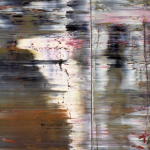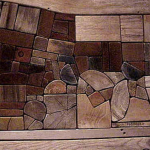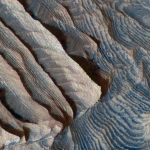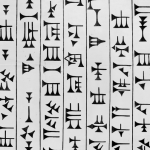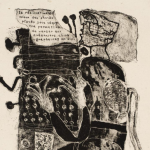newsletter
October 2024: Conversational Forms
Dear ebr, I have no idea what’s happening with your latest mailouts and, quite frankly, I don’t like it. In fact, your last mailshot’s grandiose, rambling piece was utter garbage. Too long. Too nonsensical. Too self-indulgent. Your editor is aware she’s writing a newsletter, isn’t she? I suggest she tries sticking to something short and sweet. – D. Stressed Gee whiz, Mr Stressed! You sure don’t hold back, do ya? No worries! This week, our editor is trying very hard to keep it short and sweet. Dear editor, I’ve heard that Will Luers is no longer managing editor of ebr! Are… continue
June 2024: The Infinite Information Age
Frame 1 Darkness. The outline of THE BARKER barely visible. Frame 2 Inset. Lights, camera, action. The Barker stands with her arms spread wide and a grin on her face, on a blank, white background. BARKER: WELCOME BACK TO ELECTRONIC BOOK REVIEW! THIS MONTH WE’RE HERE TO PRESENT TO YOU— TITLE: THE INFINITE INFORMATION AGE (Title should be in a sans serif font reminiscent—if not the same—as the ebr branding. White, with some fluorescent offset colors, so it pops against the black background.) Frame 3 Inset, again. The Barker is still talking as, outside the… continue
May 2024: Informative Subject Matter(s)
(Chime. Stage. Click. Lights. Trusty table. Belligerent briefcase. Flurry of paper, paraphernalia, and archontic impulse. The Barker springs. Upright, feet.) BARKER: ELECTRONIC BOOK REVIEW is here to bring you— (Inhale.) Articles! (Inhale.) Meditations! (Inhale.) GLOSSES AND INSINUATIONS! (Stark white spotlight. Automaton imitation. Hard jaw.) BARKER: As an non-AI language model, I am able to introduce you to Nick Montfort’s latest offering with this attempt at both surrealism and summary: (Pause.) the socio-cultural collective unconscious emerges fettered by $2 mal[content]ed moderators to be… continue
April 2024: Ecocritique, Fandom, Eclipses, and Gaddis, Gaddis, Gaddis
(The tick-tick-tick of a counter climbing up as messages are sent. The ding of an inbox visible to only one person. The looming crumple of an email automatically sent to ‘Trash’. A digital veil rises, allowing the brief imitation of contact to be made. Here, THE BARKER stands, center stage.) BARKER: This month, in electronic book review: (The lights drop. A pale blue spotlight bursts into life.) BARKER: Jussi Parikka, Paolo Patelli, and May Ee Wong delve into their captivating post-digital narrative work, The Environmental Audiotour, in “Ecocritique between Landscape and Data: The Environmenta… continue
March 2024: Hyper Literary Culture(s)
(A click as an unopened email is opened. A virtual curtain rises. The Barker stands alone at center stage, but we are aware of a larger editorial team working in the wings.) BARKER: Another month. Another issue. Another mailshot. (Darkness, before a hard, white spotlight pierces the gloom. The Barker stands in sharp relief.) BARKER: Data is power! Stephan Paur illuminates the issues surrounding the (in)formation of identities in Infopower and the Ideology of Extraction! (The lighting shifts, whites becoming a mix of greens and turquoises reminiscent of an affiliate’s branding. The Barker waits… continue
February 2024: Unplugging, Litera[ture]lly
WE INTERRUPT YOUR REGULARLY SCHEDULED [SUN/MON/TUES]DAY TO BRING YOU THIS MESSAGE Winter or summer, rain or shine, night or day, you can rely on the electronic book review to deliver cutting edge academia straight to your inbox! I’m TEGAN PYKE—ebr’s latest co-editor and PhD researcher in Digital Culture at the University of Bergen—and I’m here to give you the inside scoop! Join us this month for— MORE OFF CENTER! Are you a scholar interested in the interplay of creative practice and research? An academic lost in the limbo of invisible labor? A disaffected millennial looking for inspiration in… continue
June 2023: Ascension and Aesthetics, making sense of digital revolutions
Following last month’s essays about the impact of generative AI on digital writing come two articles that further address the evolving states of creativity in a rapidly changing digital world. Stuart Moulthrop’s review of Steve Tomasula’s Ascension explores the work’s cybernetic and apocalyptic dimensions. Moulthrop traces its subterranean, encyclopedic lineage through print fictions like Joyce’s Ulysses, Dos Passos’ U.S.A. trilogy, Pynchon’s Gravity’s Rainbow, DeLillo’s Underworld, David Foster Wallace’s Infinite Jest, and Zadie Smith’s White Teeth… continue
March 2023: Exploring Collaborative Storytelling and Italian E-Lit
We are excited this month to present three pieces that contribute to a richer understanding of the evolution and current state of electronic literature, and highlights the diversity of e-lit, including works outside the English language. Roberta Iadevaia’s essay is a thought-provoking analysis of the origins of Italian electronic literature and its relationship to literary traditions and contemporary aesthetics. It begins by describing the recent surge in critical attention to Italian e-lit, reviewing differing approaches of two recent essays that aim to reconstruct the history of the ge… continue
December 2022: Remembering Jeremy Hight; on The Lab Book; glitch poetics
Ahead of 2023, we wish you happy holidays with loved ones! This month, Patrick Lichty has written an in memoriam of a community member and artist, a friend to him as to many of us: the late Jeremy Hight. So not to take away from the significance of Lichty’s words and friendship with Hight, I will not add many words except to say: we at EBR remember Jeremy Hight fondly. His creative works will continue to be respected for the contributions they make to e-literature. * What is a humanities lab? How do we distinguish between a lab in the humanities and a lab in STEM–especially in various lab pro… continue
November 2022: Write Fast and Break Theory
In this November issue we’re excited to present a book review, an essay, and an interview that explore how language can provoke, challenge, and dissent, and how these capacities are propelled by the affordances of digital media. In Aden Evens’ review of Broken Theory by new media artist and theorist Alan Sondheim, Evens explores Sondheim’s eclectic and stylistic meditations on the limits of philosophy, language, and code, expressed through the author’s hybrid art and research projects. In “United Forces of Meme in Spontaneous Netprov,” Anna Nacher explores the emergence and spread of the… continue



